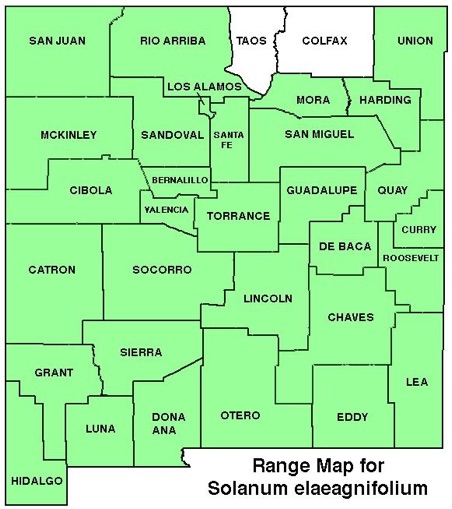WILDFLOWERS OF NEW MEXICO

A dense mat of silvery-gray hairs covers the narrow, wavy leaves and stems of this 1–3-foot tall, branching plant, plus a scattering of needlelike prickles. Note the showy blue, star-like flowers. All parts, especially the ripe yellow berries, are extremely toxic. Just a few berries can be fatal.
FLOWER: April–September. The 1-inch wide (25 mm), blue to purple (rarely white) flowers have 5 petals fused into a star-like disk. Showy yellow, finger-like stamens are all alike and add contrast to the center. Clusters of 3/4-inch (20 mm), smooth, round berries mature from green to yellow and are toxic.
LEAVES: Alternate. Blades narrow, lance-shaped to oblong, 1 1/2–6-inches long (3.8–15 cm) with entire to wavy margins; midrib has slender yellow spines reaching 3/16-inch long (5 mm).
HABITAT: Dry rocky, sandy soils of fields, pastures, roadsides, disturbed areas; desert grasslands and scrub, pinyon-juniper woodlands.
ELEVATION: 3,200–7,500 feet.
RANGE: AR, AZ, CA, CO, ID, OK, KA, LA, NM, NV, UT, TX.
SIMILAR SPECIES: Numerous Nightshades have blue flowers, but none have lance-shaped leaves covered with silvery hairs. Fendler’s Wild Potato, S. stoloniferum, in so. NM mountains, has pinnately compound leaves with 5–7 oval leaflets with short hairs but no prickles.
NM COUNTIES: Widespread statewide (not reported in Colfax, Taos cos.) in low- to mid-elevation arid habitats.

SILVERLEAF NIGHTSHADE
SOLANUM ELAEAGNIFOLIUM
Nightshade Family, Solanaceae
Perennial herb

THE CONTENTS OF THIS WEBSITE ARE COPYRIGHTED AND CANNOT BE USED
WITHOUT PERMISSION OF GEORGE OXFORD MILLER







Prickles are usually present on stems and leaves.
Leaf edges vary from wavy-lobed to entire, with or without prickles.
Fruit ripen from green to yellow and are extremely toxic.
EMAIL ME